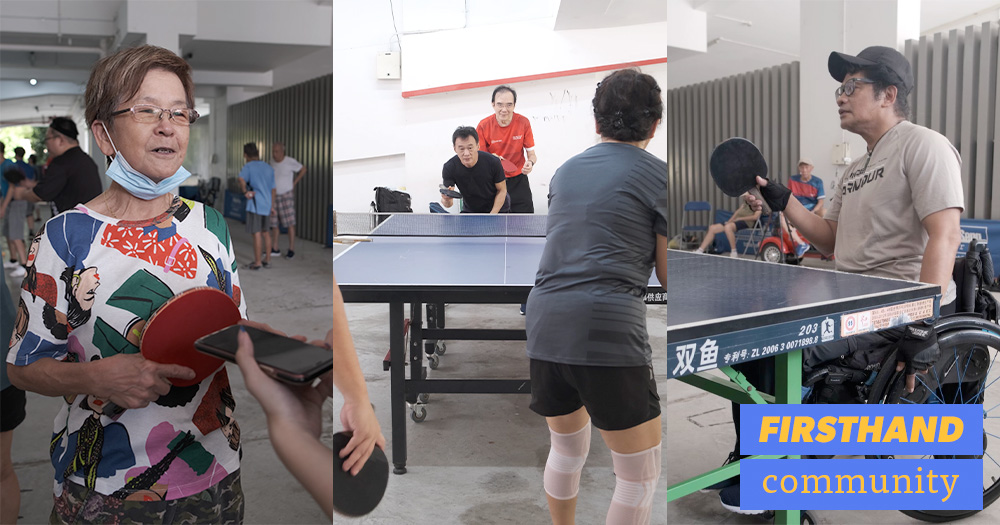Firsthand: Community is a new series by Mothership, where we explore the spirit of community in Singapore through in-depth articles and videos.
From Tampines to Tuas, we’ll investigate the untold stories of the different neighbourhoods in Singapore — firsthand.

In any other sport, it may be strange to see young men, retired aunties, and wheelchair users play against each other. But at 813 Yishun Ring Road’s table tennis free-play zone, it’s just business as usual.
Soon after exiting the Khatib MRT gantry, I was greeted with the organised chaos of eight table tennis games played simultaneously — an unusual sight.
I quickly found myself a willing spectator, peeking over barricades to watch the players at tables spanning the length of a void deck, some modified for wheelchair users.
 Photo by Kelsy Koh
Photo by Kelsy Koh
This conveniently-located play area is home to an interest group that meets five times a week. Its inclusive design has also made it a hotspot for many table tennis enthusiasts, especially those with wheelchair needs.
The group’s frontmen are a trio united by their love for table tennis and drive to spread it to as many people as possible.
The origin story
The interest group started nearly eight years ago as a casual get-together for four elderly people to play table tennis at a Yishun void deck.
Back then, the equipment was suboptimal and the area was small and improvised — nothing like the well-oiled machine it is now. The play zone, if you could call it that, had no shields against the wind or lights for the dimly lit space.
But when former Nee Soon GRC Member of Parliament Lee Bee Wah passed by one of their sessions, she suggested they move to a bigger open space — the home of the free-play zone today.
Amidst the waning pandemic in 2021, Christopher Tan, one of the group’s current organisers, got involved with the group. As the retiree tells it, he was simply “looking for something to do” when he stumbled upon the play area.
“I found that eh, this place is quite conducive.”
An engineer by training, he had enjoyed table tennis on the side for years, even getting coaching accreditation from the Singapore Table Tennis Association (STTA) and organising large-scale tournaments in Singapore.
He was then inspired by ActiveSG’s Table Tennis X initiative to take the zone to the next level. The initiative, launched in 2016, aimed to promote the sport in Singapore by placing tables in community spaces.
Growing the zone
Today, the group is so much more than a gathering of bored senior citizens.
In hopes of achieving his vision, Tan enlisted the help of grassroots leader Alran Foo and fellow table tennis enthusiast and former President of the Table Tennis Association for the Disabled (Singapore) Kelvin Pang.
Together, the trio set to work: fielding table and equipment donations, gathering accredited coaches and experienced athletes to help mentor newcomers, and publicising the space to fellow enthusiasts.
Word of mouth about the group spread, reaching players from Jurong to Pasir Ris. Even tourists from Canada and Sweden had caught wind of the zone; Tan tells me that once, a pair of young Swedish table tennis players had visited the group while on holiday in Singapore after learning about the space online.
Today, the group is filled with a mishmash of nationalities, ages, skill levels and physical abilities, who come from far and wide just to play here.
It’s a point of pride for the organisers, a fact that quickly becomes clear as Tan flicks through photos of the zone on his phone, showing me players as young as seven years old and octogenarians smiling side by side.
After all, it’s not every day you find such a convenient, well-equipped, and well-maintained space for table tennis that even caters to the elderly and disabled, with qualified coaches, and for free.
@mothership.firsthand Can you beat the aunties and uncles sharpening their table tennis skills at 813 Yishun Ring Rd? #tiktoksg #fyp #yishun ♬ Cantina Afternoon - The Fly Guy Five
Making the space wheelchair-friendly
But more than just helping senior citizens bond and socialise, the group is also refreshingly intentional about sharing the sport with players with physical and intellectual disabilities.
Of its eight tables — a big jump from its original two — three cater to para-athletes on wheelchairs.
I'd never seen such table tennis tables before. Instead of the typical straight legs, these were curved — a modification that prevents wheelchair users from crashing into the tables’ usually straight legs.
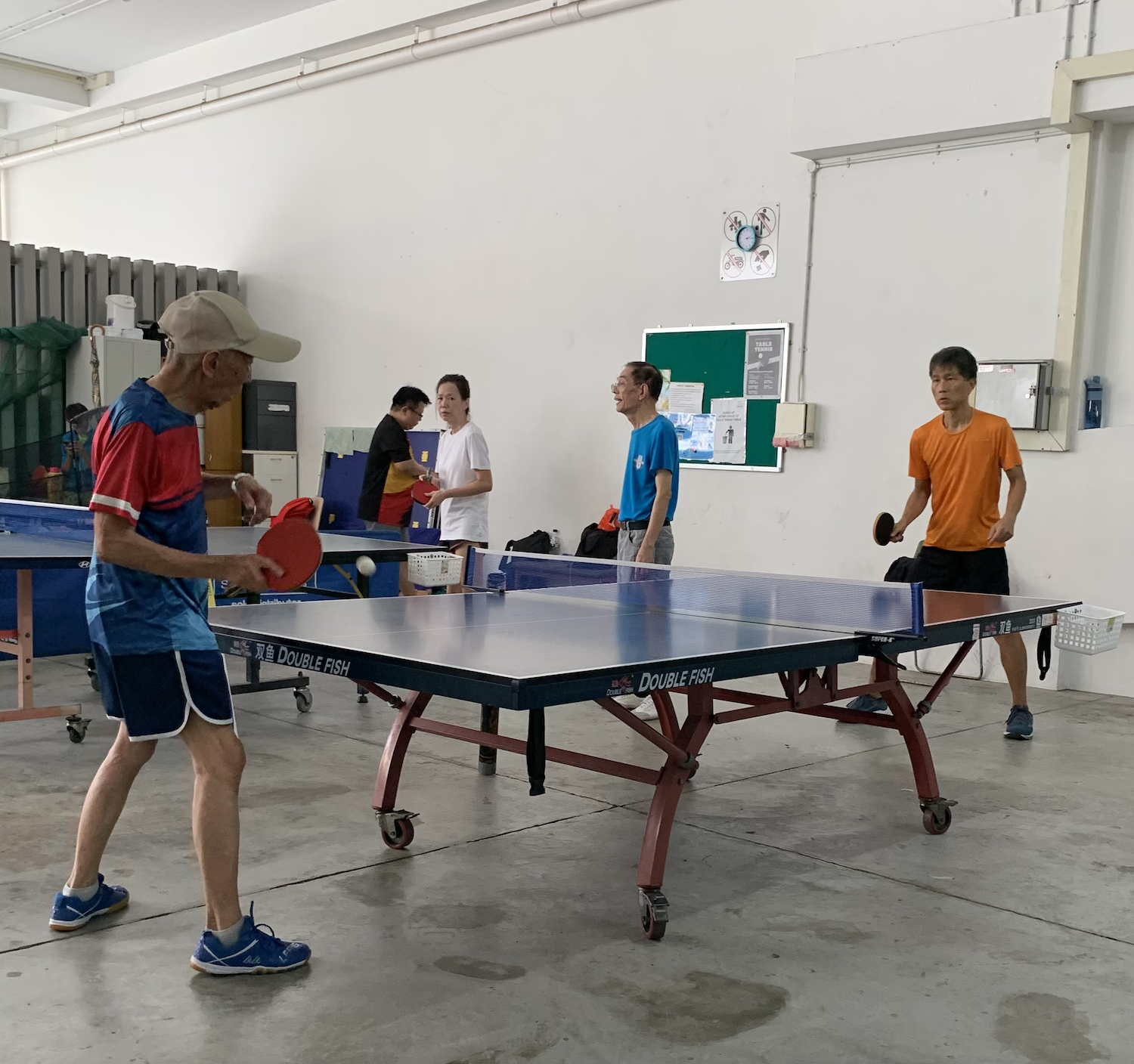 Modified table tennis tables for wheelchair users. Photo by Kelsy Koh
Modified table tennis tables for wheelchair users. Photo by Kelsy Koh
All these years, the ‘make do with what we’ve got’ attitude of the original group of elderly players has remained. This, with a sprinkle of the magic fairy dust of innovation, has kept the group going.
As we tour the zone, Pang picks up balls with three stars on them: competition-grade equipment. He says such high-quality balls can cost up to S$2 each, but have been generously donated to the group by its members or their friends.
While watching the players, I noticed players were brandishing long tubes, periodically stamping them on the ground for reasons unknown.
Pang shows me that they’re ball collector tubes made from old badminton shuttlecock containers duct-taped together. At the end of the tube is a hole small enough to pick the table tennis balls up without dropping them.
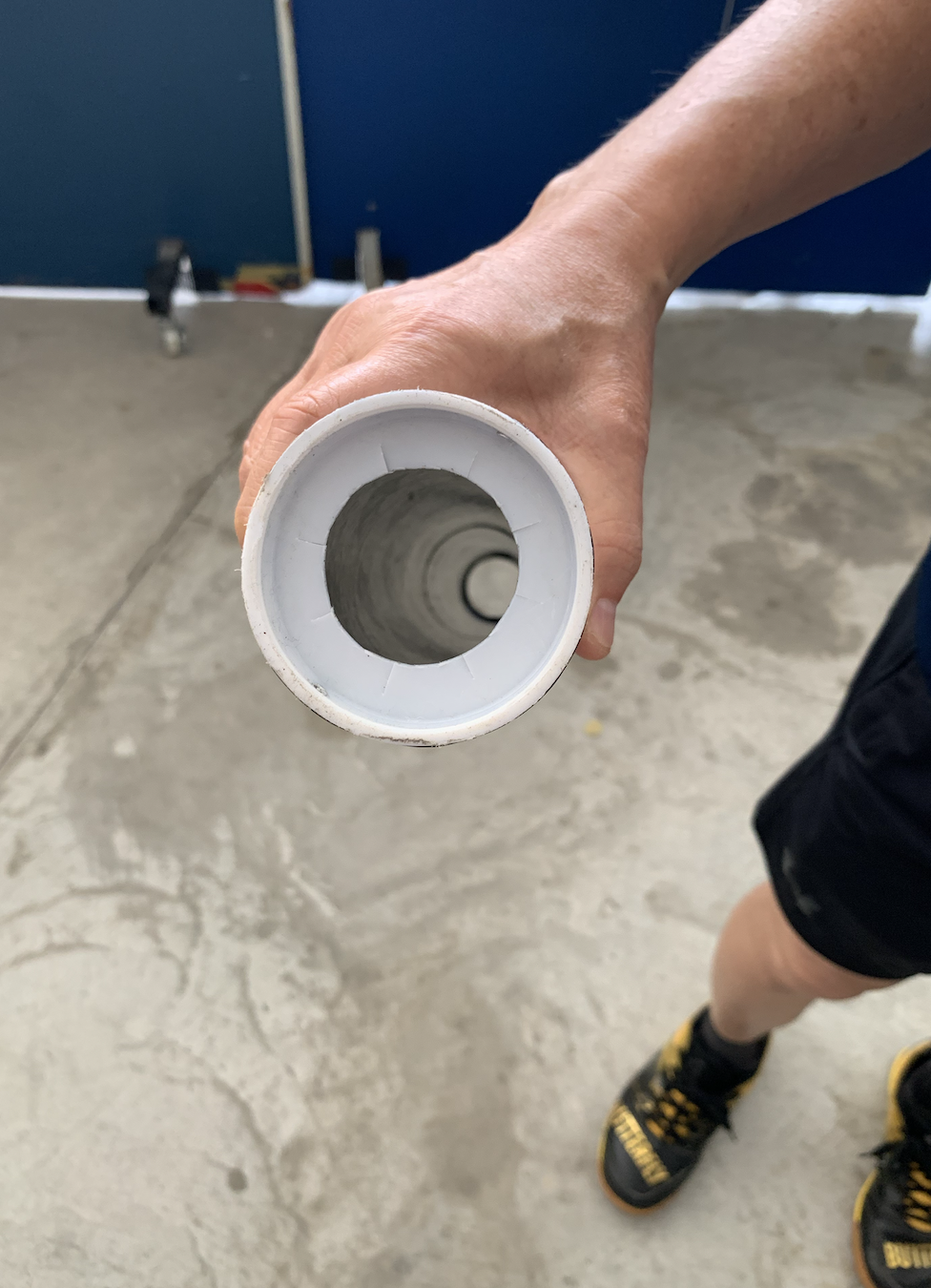 Pang showing the ball collector tube. Photo by Kelsy Koh
Pang showing the ball collector tube. Photo by Kelsy Koh
The handy devices help the elderly or wheelchair users to retrieve balls without needing to continuously bend over. Judging by the number of tubes lying around, the elegant solution is well-loved and for good reason.
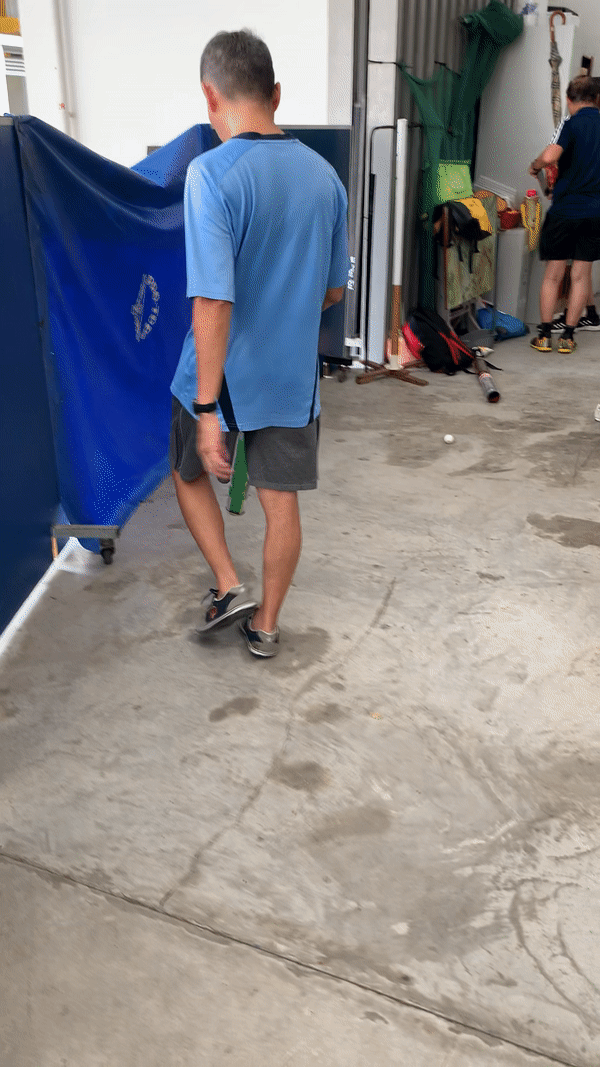 A player using the ball collector tubes. Photo by Kelsy Koh
A player using the ball collector tubes. Photo by Kelsy Koh
While he is quick to tell me the idea is not original, I’m thoroughly impressed at the amount of creativity needed to recreate such a device from affordable and readily available materials.
I'm also curious about what it takes to maintain an open-air space like this, given the abundance of (presumably expensive) equipment. In my mind, I'd imagined a rigorous plan, something to the effect of cameras, alarms and/or shutters.
As it turns out, the whole thing is based on an honour system.
They simply shrug when I ask if they have ever had bad experiences with people who try to steal or damage the shared equipment.
They’ve reached an understanding with regular players, who take good care of the equipment because they recognise that a fully-equipped, free-of-charge play area like this is hard to find.
At the same time, the regulars remind new members to take care of the zone. Foo tells me that if he spots unfamiliar faces heading to the zone, he also passes the reminder along.
As Tan puts it:
"Everything you see there is the effort of everyone who chips in a little bit here and there to keep the place running."
Table tennis therapy
As we talk over some coffee, it becomes clear that the organisers see tremendous potential in the simple motion of batting a small orange ball back and forth.
They list the ways table tennis can be physically and socially therapeutic. "We want to [pass] this on to people with other disabilities like dementia and Parkinson’s disease, to use this place partially for rehabilitation, getting them to improve their motor skills," Tan explains.
Plus, the location is almost preternaturally suited for para-athletes. Near an MRT station, without cumbersome slopes or unsheltered paths, the zone’s location really is “perfect” as Pang says.
Leaning in, Pang cheekily divulges his “ulterior motives” for this initiative. He hopes to use the zone to develop talent for international competitions, like the upcoming 2029 ASEAN Para Games held in Singapore.
While in other countries, it's not hard to find para-athletes that qualify, the lack of resources dedicated to para-athletes’ development and players makes it much harder in Singapore. This space, he hopes, will help talent to blossom organically.
In fact, Pang even sometimes approaches random wheelchair users to invite them to the group, hoping to scout the next big thing.
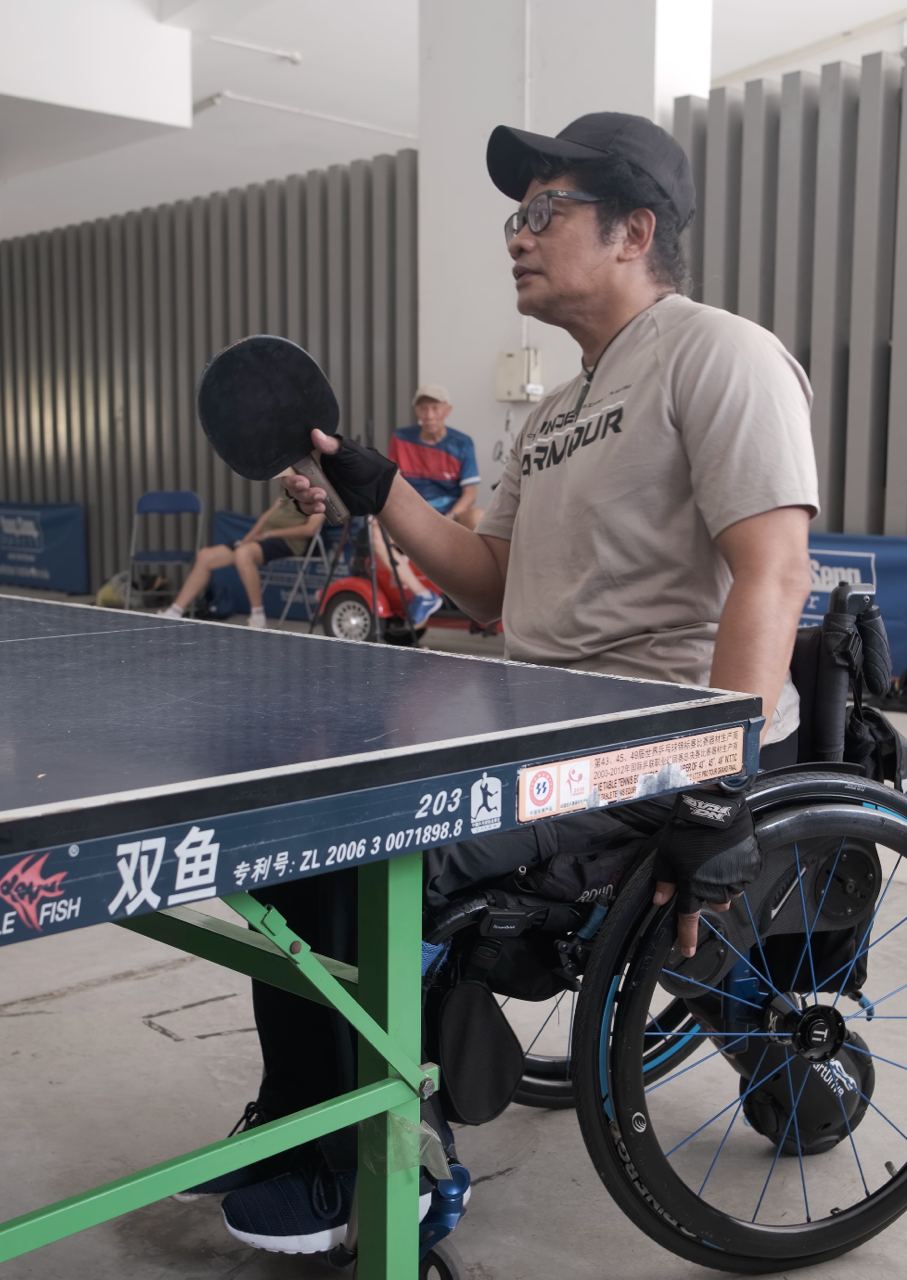 Photo by Andrew Koay
Photo by Andrew Koay
Why people keep coming back
Despite their best efforts, the zone still feels a little improvised, and perhaps temporary.
The barricades outlining the zone and keeping the balls in and the wind out are actually repurposed retired table tennis tables, rather than permanent structures like pillars.
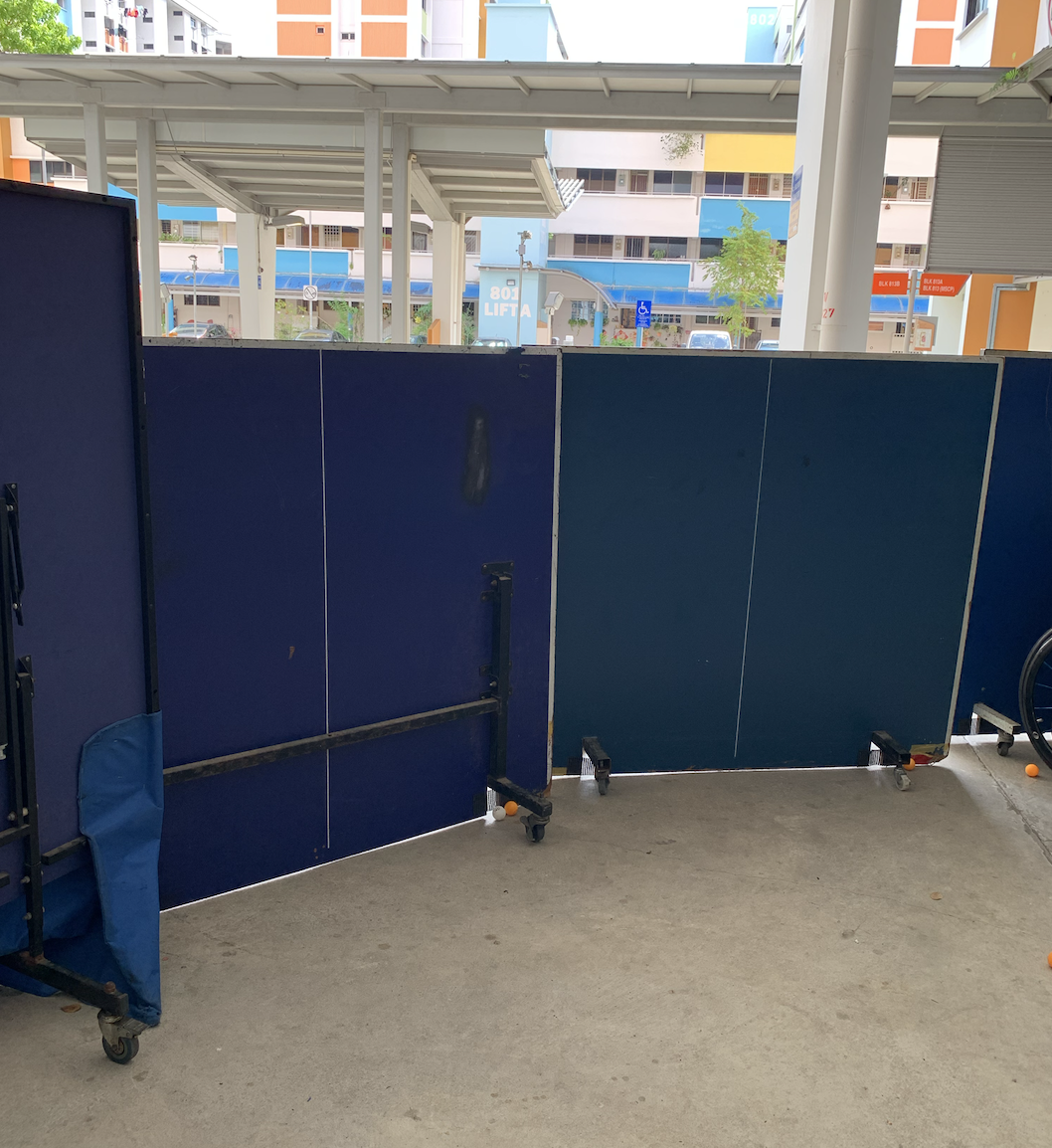 Table tennis tables acting as barricades. Photo by Kelsy Koh
Table tennis tables acting as barricades. Photo by Kelsy Koh
Surely there must be more conducive play areas. So why do players keep coming back?
A big draw for the players I talked to were the people here.
Elsewhere, they say, coaches “gatekeep” their secrets, which they only divulge after being paid handsomely.
Yet, sessions at the zone are devoted to both teaching novices and levelling up skilled players by providing extra sparring practice.
In fact, the interest group is sustained by a list of players turned coaches that grows every day.
Pang proudly introduces me to his “assistant coaches”, some of whom started at the group without knowing how to hold a table tennis bat.
Now, their bats are practically extensions of their arms, and they pass on their newfound knowledge of the intricacies of the seemingly simple game to other newbies.
Shao Hua (transliterated from Chinese), is one such “assistant coach”. The 72-year-old has only been playing with the group for three months but jumps at every opportunity to play, even for half an hour.
She tells me that she continues to play here because the people here are warm and friendly. I'm unsurprised by that, having felt the same hospitality when I first walked into the zone, even getting a few inviting smiles — they are accustomed to newbies.
Afterwards, I reason that although most things are neither shiny nor new, the zone’s wear and tear shows everything has been well-loved for a long time.
The makeshift-ness of the zone, a little dingy and lit by small LED bulbs, also adds to its homegrown charm.
Besides, the members’ passion for the sport and each other is a promising sign that the zone is here to stay.
Giving back: ‘I’m a Nee Soon boy’
For the organisers, table tennis is their love language. The zone is a way for them to marry their love for the sport and those in their neighbourhood.
Tan’s rationale for putting all that time and effort into this initiative is simply this:
“[I] just try to do something for a good cause. We are all just free people, just want to do something to make people happy and keep ourselves busy.”
Pang says that as an organiser, the zone is an expression of his love for the place he has spent most of his life in.
“I’m a Nee Soon boy," he tells me. "I grew up in Nee Soon Village, which [existed] even before the estate was developed. I’m a bonafide Nee Soon boy. So I’m giving back because I belong here. This is my hometown.”
“If you have a life without purpose, that’s quite dangerous," he adds. "I find it very meaningful to help out."
Before I leave, Pang excuses himself. All smiles, he passes something in red wrapping paper to 22-year-old Jason, one of the players in attendance.
The gift? A “pistol bat” for him to have a firmer grip on the paddle as his hands can sometimes be shaky.
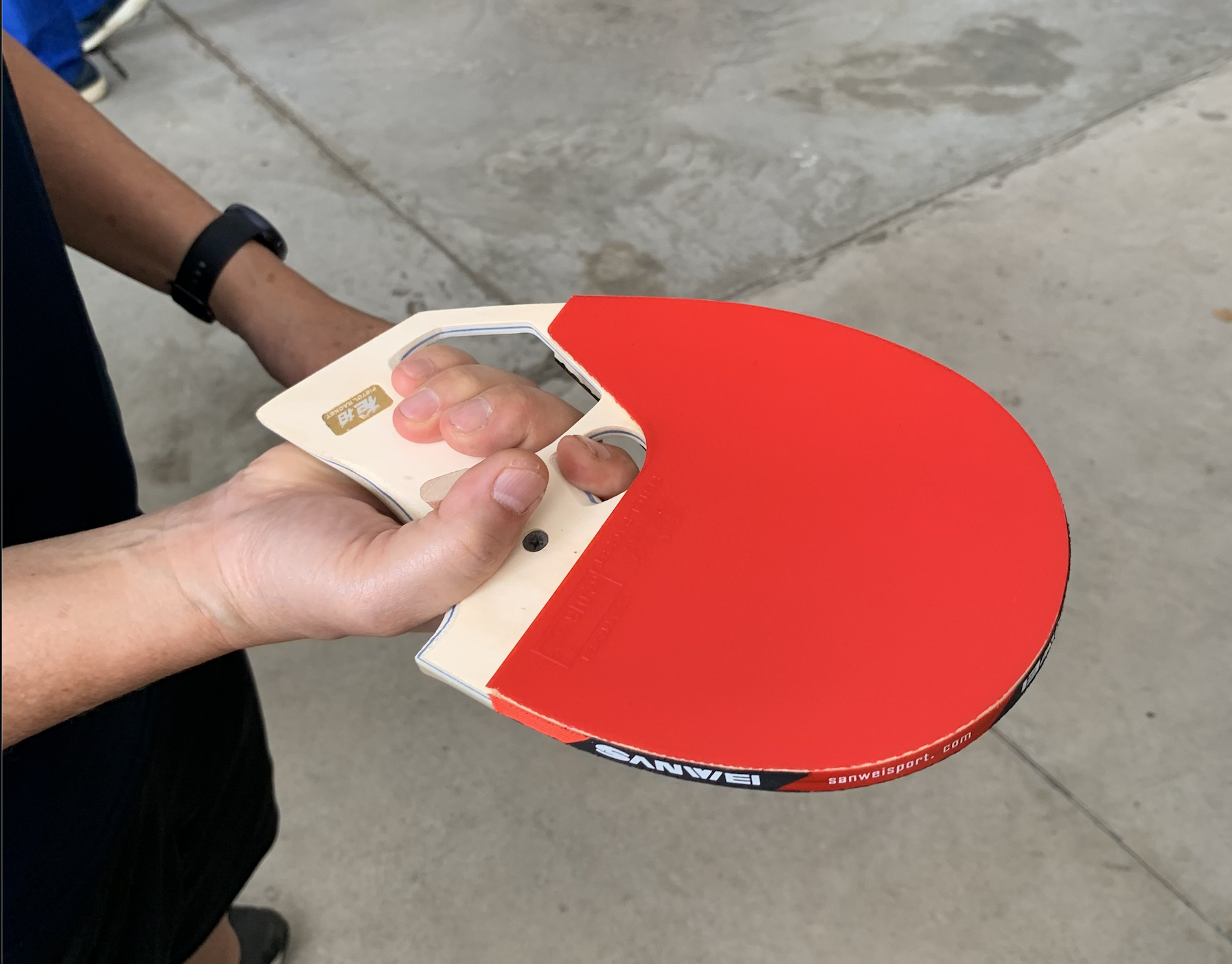 A pistol bat. Photo by Kelsy Koh
A pistol bat. Photo by Kelsy Koh
According to Pang, Jason has an intellectual disability. He sometimes doesn’t feel confident enough to play, mostly keeping to himself.
It's now that Pang divulges his true "ulterior motive": nothing about athleticism or talent, but rather the simple hope that he'll be able to reach out to more intellectually disabled and special needs students through the group. Because they often have very few friends, he says.
He finally confides, “I was going to treat [Jason] to a birthday meal, but I thought this would be more meaningful.”
It’s this final thing that convinces me that at 813 Yishun Ring Road, table tennis is an equaliser — no one is any different here, no matter what others say.
The zone's thoughtful yet invisible accommodations seem to allow people to shed society's labels, even for a moment, and just play a game of table tennis.
If the group’s love language is table tennis, then I suppose Pang's gift, and the zone, is a loving affirmation: "This is a safe haven. Anyone can find a place here, and we accept you."
Have something even more interesting going on in your neighbourhood? One-up us at [email protected].
Firsthand is a new content pillar by Mothership, featuring in-depth stories about people and their issues.

Top image by Andrew Koay
If you like what you read, follow us on Facebook, Instagram, Twitter and Telegram to get the latest updates.

